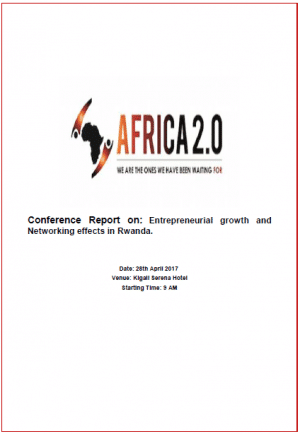
The African Policy Dialogue on entrepreneurship development in Rwanda on entrepreneurship development in Rwanda held a conference on 28 April 2017 in Kigali, Rwanda. The conference built on the inception workshop which identified four areas for study on entrepreneurship development. The conference deliberations were based on findings and recommendation of four thematic studies, whose key findings and recommendations are explained below.
1. Mindset and entrepreneurial activities in Rwanda: a firm level investigation
Key findings
- Entrepreneurs with an entrepreneurial mind set perform better in terms of creativity and risk taking propensity which are vital for business success.
- An entrepreneurial mind set is an important factor of performance and sustainability in Rwanda without which a business would fail.
Recommendation
- Establish entrepreneurial education activities to nurture and support firm’s success.
2. Impact of access to finance services on business development in Rwanda
Key findings
- Factors that affect access to finance include age of the firm, interest and education
- There is a positive relationship between access to finance and business development
Recommendation
- There is a need to develop more policies that increase access to finance for firms and households
3. Innovation and firms’ performance in the Rwandan manufacturing industry: a firm level empirical analysis
Key findings
- Product innovation is linked directly to the process innovation, meaning that firms which engage in process innovation have introduced new or improved products on the market
- Innovation output, here the ‘international quality-recognition’, is not linked to the firm engagement in innovation. It is linked to the use of technology licensed from foreign firms
- The ‘international quality-recognition’ is the main determinant of firm’s financial performance.
Recommendations
- Develop strategies for public assistance in research and development to private manufacturing firms in order to boost their innovativeness.
- It is advisable that manufacturing firms apply for an ‘international quality-recognition’, because it is important for their financial sustainability.
4. Effects of corporate governance on corporate entrepreneurship and firm performance: evidence from the Rwandan manufacturing industry
Key findings
- The background of top managers contributes significantly to both corporate entrepreneurship and corporate performance
- The sole proprietorship organizational form harms entrepreneurial activities and is negatively related to financial performance of manufacturing firms because of considerable financial constraints
- Electricity and raw materials expenses contribute significantly and positively to financial performance of Rwandese manufacturing firms
- Informal competition has no effect on entrepreneurial activities of manufacturing firms, however it harms their financial performance because firms are more interested in the short term business development rather than in the long term strategic innovative actions.
Recommendations
- In order to boost internal entrepreneurial activities of manufacturing firms, focusing more on the background and motivation of top managers.
- Help manufacturing firms to access finance, the key element for their internal entrepreneurship development.
- Avail electricity and raw materials in order to improve manufacturing firms’ financial performance, because they are important for the corporate entrepreneurship.









